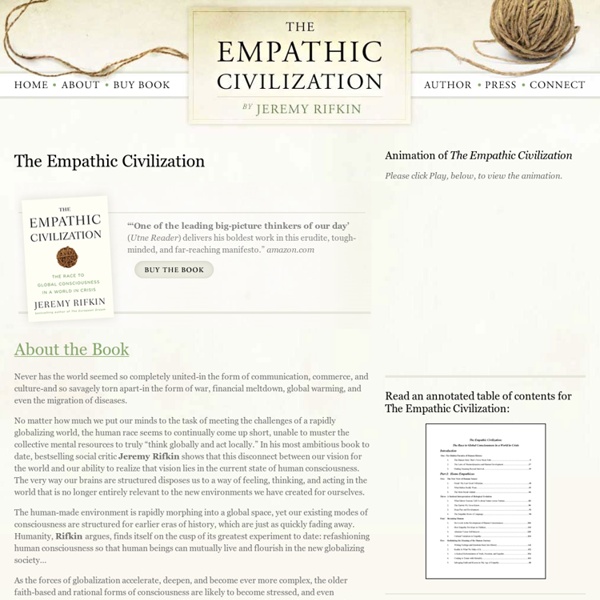The Empathic Civilization
The Empathic Civilization: The Race to Global Consciousness in a World in Crisis is a 2010 non-fiction book written by Jeremy Rifkin. It connects the evolution of communication and energy development in civilizations with psychological and economic development in humans. Rifkin considers the latest phase of communication and energy regimes—that of electronic telecommunications and fossil fuel extraction—as bringing people together on the nation-state level based on democratic capitalism, but at the same time creating global problems, like climate change, pandemics, and nuclear proliferation. Rifkin extrapolates the observed trend into the future, predicting that Internet and mobile technology along with small-scale renewable energy commercialization will create an era of distributed capitalism necessary to manage the new energy regime and a heightened global empathy that can help solve global problems. The book was published by Jeremy P. Tarcher Inc. as a hardcover in January 2010.
Ode to Empathy
The discussion around empathy seems to be growing exponentially. From the huge splash Brené Brown is making with her work on shame, vulnerability and empathy to Jeremy Rifkin’s vision of our moving towards an Empathic Civilization, empathy is becoming a 21st century buzzword. And rightfully so. With the emergence of a global civilization, we need to move beyond the “us and them” mentality that lends itself to so much conflict, violence, and self-destruction.
Who Controls the Internet?
The Internet is subject to control because its infrastructure is subject to control Who Controls the Internet? Illusions of a Borderless World is a 2006 book by Jack Goldsmith and Tim Wu that offers an assessment of the struggle to control the Internet.[1] Starting with a discussion of the early vision of a borderless global community, the authors present some of the most prominent individuals, ideas and movements that have played key roles in developing the Internet. As law professors at Harvard and Columbia, respectively, Goldsmith and Wu assert the important role of government in maintaining Internet law and order while debunking the claims of techno-utopianism that have been espoused by theorists such as Thomas Friedman. Overview[edit]
E.O. Wilson Biodiversity Foundation » E.O. Wilson
Edward Osborne Wilson, University Research Professor Emeritus at Harvard, is the guiding force that shapes the mission of the E.O. Wilson Biodiversity Foundation. You can reach Dr. Wilson directly at: Edward O.
Jeremy Rifkin: 'The Empathic Civilization': Rethinking Human Nature in the Biosphere Era
Two spectacular failures, separated by only 18 months, marked the end of the modern era. In July 2008, the price of oil on world markets peaked at $147/ barrel, inflation soared, the price of everything from food to gasoline skyrocketed, and the global economic engine shut off. Growing demand in the developed nations, as well as in China, India, and other emerging economies, for diminishing fossil fuels precipitated the crisis. Purchasing power plummeted and the global economy collapsed.
Inequity aversion
Inequity aversion (IA) is the preference for fairness and resistance to incidental inequalities.[1] The social sciences that study inequity aversion include sociology, economics, psychology, anthropology, and ethology. Human studies[edit] IA research on humans mostly occurs in the discipline of economics though it is also studied in sociology.
Cowed
The Hidden Impact of 93 Million Cows on America’s Health, Economy, Politics, Culture, and Environment Denis Hayes (Author), Gail Boyer Hayes (Author) From leading ecology advocates, a revealing look at our dependence on cows and a passionate appeal for sustainable living. In Cowed, globally recognized environmentalists Denis and Gail Boyer Hayes offer a revealing analysis of how our beneficial, centuries-old relationship with bovines has evolved into one that now endangers us. Long ago, cows provided food and labor to settlers taming the wild frontier and helped the loggers, ranchers, and farmers who shaped the country’s landscape.
Law of Complexity/Consciousness
The Law of Complexity/Consciousness is the postulated tendency of matter to become more complex over time and at the same time to become more conscious. The law was first formulated by Jesuit priest and paleontologist Pierre Teilhard de Chardin. Teilhard holds that at all times and everywhere, matter is endeavoring to complexify upon itself, as observed in the evolutionary history of the Earth. Matter complexified from inanimate matter, to plant life, to animal life, to human life.
Bystander effect
Social psychology research[edit] Variables affect bystanders[edit] Emergency versus non-emergency situations[edit]
Linked: The New Science of Networks
Linked: The New Science of Networks is a popular science book written by the Hungarian physicist Albert-László Barabási and first published by the Perseus Books Group in 2002.[1] Barabási has changed the way of thinking about real-world networks and largely contributed to making networks the revolutionary science of the 21st century. Linked is his first book that introduces the highly developing field of Network Science to the broad audience.
Denis Hayes - Cowed
Conventional beef impacts our health, ruins our environment, and exacerbates the climate crisis more than any other type of meat. Why the more than 96 percent of Americans who aren’t vegetarian need to eat less feedlot beef—and how to get them there. Denis Hayes and Gail Boyer Hayes first started paying attention to cows during a trip to the United Kingdom, where they were struck by the many small-scale herds they encountered in roadside pastures.
BenRayfield: Global Telepathy Network
The universe equals Chaitin's Constant. I will explain how to use it statistically to create a global telepathy network, which we would eventually learn to use for more advanced things. UPDATE: This thread explains something which is true about the multiverse (in my opinion) but is less relevant to creating a global telepathy network than my Gravity For Patterns theory: UPDATE: I explained it in a different way here



